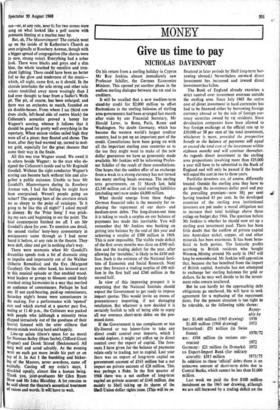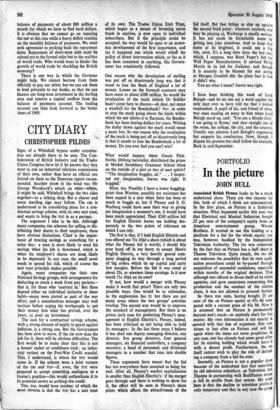Give us time to pay MONEY
NICHOLAS DAVENPORT
On his return from a sterling holiday in Cyprus Mr Roy Jenkins almost immediately saw Professor Schiller, the German Economics Minister. This opened yet another phase in the endless sterling dialogue between the ux and its creditors.
It will be recalled that a new medium-term stand-by credit for $2,000 million to offset fluctuations in the sterling balances of sterling area governments had been arranged last month -after visits by our Financial Secretary, Mr Harold Lever, to Bonn, Paris, Rome and Washington. No doubt Germany, which has become the western world's largest creditor country, had to put up an important part of the credit. Consultations have been going on with all the important sterling area countries as to the use they might want to make of the new dollar guarantees we have so generously made available. Mr Jenkins will be informing Profes- sor Schiller of the result of these consultations. One hopes that the sudden offer of an exchange from a weak to a strong currency has not turned too many sterling heads overseas. The sterling area governments, on 31 March last, held £2,340 million out of the total sterling liabilities (excluding IMF) now under £4,000 million.
What should emerge from these Anglo- German financial talks is the necessity for re- phasing the repayment of our short- and medium-term debts. The long-drawn-out time it is taking to reach a surplus on our balance of payments has made this inevitable. You will remember that Mr Jenkins was banking on getting into balance by the end of this year and achieving a surplus of £500 million in 1969. This is now impossible. The visible trade deficit of the first seven months was close on £500 mil- lion and the trading deficit for the year, after allowing for Invisibles,' is likely to be £430 mil- lion. Such is the estimate of the National Insti- tute of Economic and Social Research. Next year they forecast a trading surplus of £90 mil- lion in the first half and £260 million in the second half.
In view of this improving prospect it is surprising that the National Institute should expect the Government to get ready to impose import quotas. This would invite an excess of precautionary importing, if not damaging retaliation. But whatever is now decided it is certainly foolish to talk of being able to repay all our overseas short-term debts on the pro- mised dates.
If the ^Government is too complacent or too lily-livered or too laisser-faire to take any direct credit control over imports, which I would deplore, it might yet stiffen up its direct control over the export of capital. The fore- casts I have given for the balance of payments relate only to trading, not to capital. Last year there was an export of long-term capital on government account of 1163 million but a net import on private account of £28 million. This was perhaps a fluke. In the first quarter of 1968 there was a net outflow of long-term capital on private account of 1148 million, due mainly to Shell taking up its shares of the Shell Union dollar rights issue. (This will be re-
financed in later periods by Shell long-term bor- rowing abroad.) Nevertheless outward direct investment has increased and inward direct investment has fallen.
The Bank of England already exercises a strict control over investment overseas outside the sterling area. Since July 1965 the entire cost of direct investment in hard currencies has had to be financed either by borrowing foreign currency abroad or by the sale of foreign cur-. rency securities owned by tie residents. Since devaluation companies have been allowed to buy foreign exchange at the official rate up to £50,000 .or 50 per cent of the total investment, whichever is more, provided the prospective benefit to the balance of payments will equal or exceed the total cost of the investment within eighteen months and will continue thereafter. As regards direct investment in the sterling area propositions involving more than £25,000 a year still have to be submitted to the -Bank of England and will only be passed if the benefit will equal the cost in two to three years.
Portfolio investors are, of course, differently
treated. Outside the sterling area they have to go through the investment dollar pool and pay the prevailing premium—now 381 per cent having touched 43 per cent. In the developed countries of the sterling area institutional investors are put under a moral obligation not to increase their total holdings above those ruling on budget day 1966. The question before Mr Jenkins is whether he should now set up a sterling area investment pool. There has been little doubt that the outflow of private capital into Australian nickel, copper, oil and other minerals has been enormous. It has been bene- ficial to both parties. The fantastic profits accruing to British residents who bought Westera,Mining around 50s early in 1967 will long be remembered. Mr Jenkins will appreciate that, because she has benefited from the import of British capital, Australia has not attempted to exchange her sterling balances for gold or dollars. So he may well decide to let the invest- ment rules remain unaltered.
But he can hardly let the approaching debt obligations go unaltered. He will have to seek agreement for -a rephasing of The repayment dates. For the present situation is too tight to be tolerable, as the following table shows: Repay-
able by
IMF: $1,400 million (1965 drawing) 1970 $1,400 million (1968 drawing) 1973 Switzerland.: 151 million (in Swiss
francs) 1970/ 72 ins: £104 million (in various cur-
rencies) 1972 Germany: £21 million (in D-marks) 1972 us Export-Import Bank for military aircraft): $315 million 1973175 In addition to -these 'official' debts ,there is an unknown amount of short-term debts due to Central Bas s, which cannot be less than $1,000 million.
Last week we paid the first $100 million instalment on the 1965 IMF drawing, although we are still :harassed by a trading deficit on the balance of payments of about $80 million a month for which we have to find hard dollars. It is obvious that we cannot go on repaying the IMF at this rate while a heavy deficit remains on the monthly balance of payments. We must seek agreement to pushing back the repayment dates. Repayment of short-term debt must be related not to the formal rules but to the realities of world trade. Who would want to hinder the growth of world trade by shackling the British economy?
There is one way in which the Germans might help. We cannot borrow from them officially to pay our debts; but we can ask them to lend privately to our banks, so that we can finance our long-term investment in the sterling area and remove a capital outflow from the balance of payments account. The trading account can then look forward to the better times of 1969.



































 Previous page
Previous page